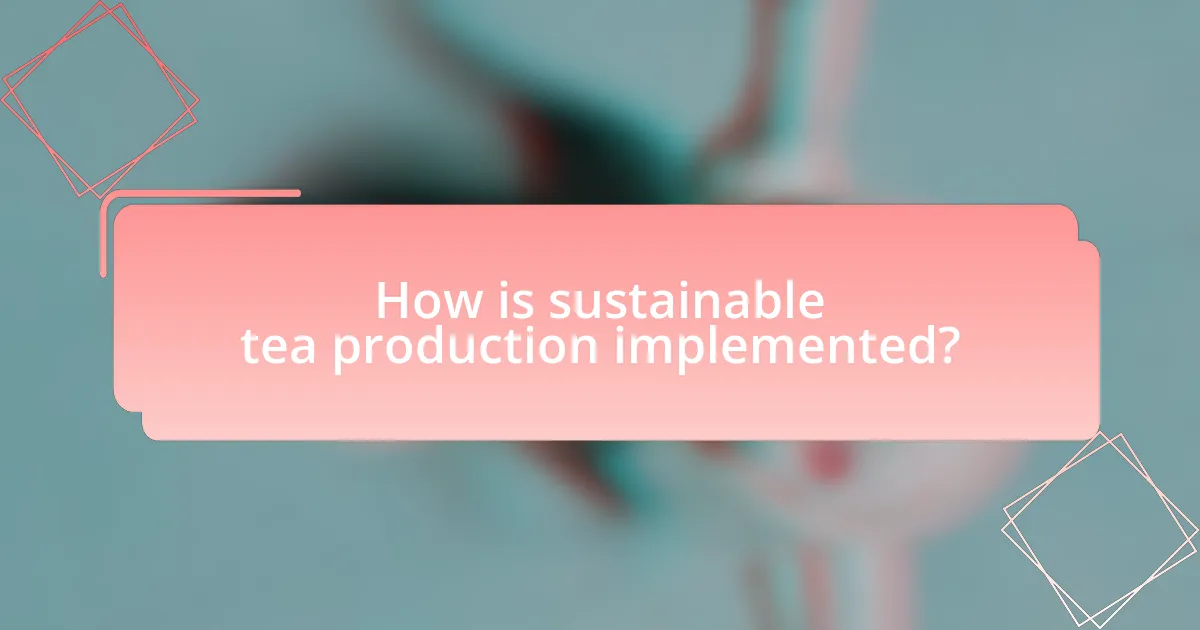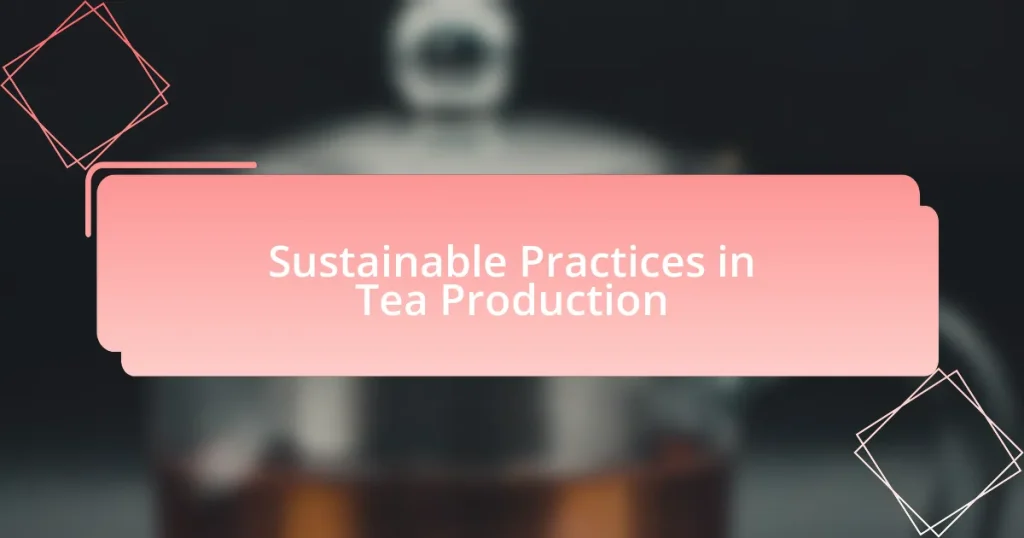Sustainable practices in tea production encompass methods such as organic farming, agroforestry, water conservation, and fair labor practices, all aimed at promoting environmental health, economic viability, and social equity. The article highlights the importance of sustainability in ensuring the long-term viability of tea farming while mitigating environmental impacts like deforestation and soil degradation. It discusses the key principles of sustainable tea production, including environmental stewardship and social equity, and examines how organic farming and biodiversity contribute to sustainability. Additionally, the article addresses the economic benefits of sustainable practices, market trends, and the role of certifications in influencing consumer choices and supporting producers in adopting eco-friendly methods.

What are Sustainable Practices in Tea Production?
Sustainable practices in tea production include organic farming, agroforestry, water conservation, and fair labor practices. Organic farming eliminates synthetic pesticides and fertilizers, promoting soil health and biodiversity. Agroforestry integrates tea cultivation with tree planting, enhancing ecosystem services and carbon sequestration. Water conservation techniques, such as rainwater harvesting and drip irrigation, reduce water usage and protect local water sources. Fair labor practices ensure that workers receive fair wages and safe working conditions, contributing to social sustainability. These practices collectively support environmental health, economic viability, and social equity in the tea industry.
Why is sustainability important in tea production?
Sustainability is important in tea production because it ensures the long-term viability of tea farming while minimizing environmental impact. Sustainable practices, such as organic farming and agroforestry, help preserve biodiversity, improve soil health, and reduce chemical usage, which can lead to healthier ecosystems. For instance, according to the International Tea Committee, sustainable tea production can enhance the livelihoods of farmers by providing better market access and premium prices for sustainably sourced tea. Additionally, sustainable practices contribute to climate resilience, helping tea crops adapt to changing weather patterns, which is crucial given that tea is sensitive to climate variations.
What environmental impacts does traditional tea production have?
Traditional tea production has significant environmental impacts, including deforestation, soil degradation, and water pollution. The cultivation of tea often leads to the clearing of forests, which disrupts local ecosystems and contributes to biodiversity loss. For instance, studies indicate that tea plantations in regions like Assam, India, have resulted in the loss of over 50% of forest cover in some areas. Additionally, the use of chemical fertilizers and pesticides in traditional tea farming can lead to soil degradation and water contamination, affecting both local water sources and surrounding agricultural lands. Research has shown that runoff from tea plantations can carry harmful chemicals into nearby rivers, impacting aquatic life and human health.
How does sustainable tea production mitigate these impacts?
Sustainable tea production mitigates environmental and social impacts by implementing practices that promote ecological balance and community welfare. These practices include organic farming, which reduces chemical pesticide use, thereby protecting biodiversity and soil health. Additionally, sustainable tea production often involves agroforestry techniques, which enhance carbon sequestration and reduce deforestation. For instance, a study by the Rainforest Alliance found that certified sustainable tea farms can reduce soil erosion by up to 50% compared to conventional farms. Furthermore, fair trade practices ensure that tea workers receive fair wages and better working conditions, contributing to social equity. This holistic approach not only addresses environmental degradation but also supports the livelihoods of local communities.
What are the key principles of sustainable tea production?
The key principles of sustainable tea production include environmental stewardship, social equity, and economic viability. Environmental stewardship involves practices that protect ecosystems, such as organic farming, integrated pest management, and water conservation techniques. Social equity focuses on fair labor practices, community engagement, and ensuring that workers receive fair wages and safe working conditions. Economic viability emphasizes the need for profitability while maintaining sustainable practices, which can be supported by certifications like Fair Trade and Rainforest Alliance that promote responsible sourcing. These principles collectively contribute to a holistic approach that balances ecological health, social justice, and economic success in the tea industry.
How do organic farming practices contribute to sustainability?
Organic farming practices contribute to sustainability by promoting biodiversity, enhancing soil health, and reducing chemical inputs. These practices, such as crop rotation and the use of organic fertilizers, improve soil structure and fertility, which leads to increased agricultural productivity over time. Research indicates that organic farming can increase biodiversity by providing habitats for various species, thus supporting ecosystem balance. Additionally, organic methods significantly lower the reliance on synthetic pesticides and fertilizers, which can contaminate water sources and harm non-target organisms. A study published in the journal “Agriculture, Ecosystems & Environment” found that organic farming systems can reduce greenhouse gas emissions by up to 40% compared to conventional farming. This evidence underscores the role of organic farming in fostering sustainable agricultural practices.
What role does biodiversity play in sustainable tea production?
Biodiversity plays a crucial role in sustainable tea production by enhancing ecosystem resilience, promoting pest control, and improving soil health. Diverse plant and animal species contribute to a balanced ecosystem, which helps in naturally regulating pests and diseases that can affect tea crops. For instance, the presence of beneficial insects and birds can reduce the need for chemical pesticides, leading to healthier tea plants and a more sustainable farming practice. Additionally, diverse root systems from various plants improve soil structure and nutrient cycling, which is essential for maintaining soil fertility over time. Studies have shown that tea plantations with higher biodiversity levels yield better quality tea and are more resilient to climate change impacts, thus supporting long-term sustainability in tea production.
What are the economic benefits of sustainable tea practices?
Sustainable tea practices provide significant economic benefits, including increased profitability for farmers and enhanced market access. By adopting environmentally friendly methods, tea producers can reduce costs associated with chemical inputs and improve soil health, leading to higher yields over time. For instance, a study by the International Union for Conservation of Nature found that organic tea farms can yield up to 20% more profit due to premium pricing for sustainably sourced products. Additionally, sustainable practices attract consumers who are willing to pay more for ethically produced tea, thus expanding market opportunities. Furthermore, sustainable practices can lead to improved resilience against climate change, ensuring long-term economic stability for tea producers.
How can sustainable practices improve profitability for tea farmers?
Sustainable practices can improve profitability for tea farmers by reducing costs and increasing market access. Implementing methods such as organic farming and integrated pest management lowers input costs associated with chemical fertilizers and pesticides. For instance, a study by the International Tea Committee found that organic tea production can yield higher prices, with organic tea fetching up to 30% more in the market compared to conventional tea. Additionally, sustainable practices enhance soil health and biodiversity, leading to better crop resilience and potentially higher yields over time. This combination of cost reduction and premium pricing directly contributes to increased profitability for tea farmers.
What market trends support sustainable tea production?
Market trends supporting sustainable tea production include increasing consumer demand for organic and ethically sourced products, as well as a growing emphasis on environmental sustainability among producers. The organic tea market is projected to grow at a CAGR of 10.5% from 2021 to 2028, indicating a strong preference for products that are free from synthetic pesticides and fertilizers. Additionally, certifications such as Fair Trade and Rainforest Alliance are gaining traction, as consumers are more inclined to purchase tea that ensures fair labor practices and environmental conservation. This shift is further reinforced by the rise of eco-conscious brands that prioritize sustainability in their supply chains, reflecting a broader societal trend towards responsible consumption.

How is sustainable tea production implemented?
Sustainable tea production is implemented through practices that minimize environmental impact, promote social equity, and ensure economic viability. These practices include organic farming methods that avoid synthetic pesticides and fertilizers, thereby protecting biodiversity and soil health. Additionally, sustainable tea producers often engage in agroforestry, which integrates tea cultivation with tree planting to enhance ecosystem services. Certification programs, such as Rainforest Alliance and Fair Trade, provide guidelines and standards that help producers adopt sustainable practices while ensuring fair wages and working conditions for laborers. According to the International Tea Committee, approximately 20% of global tea production is certified as organic or sustainable, reflecting a growing commitment to these practices within the industry.
What farming techniques are used in sustainable tea production?
Sustainable tea production employs techniques such as organic farming, agroforestry, and integrated pest management. Organic farming eliminates synthetic fertilizers and pesticides, promoting soil health and biodiversity. Agroforestry involves planting tea alongside other crops and trees, enhancing ecosystem services and reducing erosion. Integrated pest management combines biological, cultural, and mechanical practices to control pests sustainably, minimizing chemical use. These techniques collectively contribute to environmental conservation and improved livelihoods for farmers, as evidenced by studies showing increased biodiversity and soil quality in organic tea farms compared to conventional methods.
How does agroforestry enhance sustainability in tea farming?
Agroforestry enhances sustainability in tea farming by integrating trees and shrubs with tea crops, which improves biodiversity and soil health. This practice promotes a balanced ecosystem, allowing for natural pest control and reducing the need for chemical pesticides. Additionally, the presence of trees helps in carbon sequestration, mitigating climate change effects. Research indicates that agroforestry systems can increase soil organic matter by up to 30%, leading to improved water retention and nutrient availability, which are crucial for tea plant growth. Furthermore, agroforestry can provide additional income sources for farmers through the cultivation of fruits, nuts, or timber, thereby enhancing economic resilience.
What are the benefits of using natural pest control methods?
Natural pest control methods offer several benefits, including reduced chemical exposure, enhanced biodiversity, and improved soil health. These methods minimize the use of synthetic pesticides, which can harm non-target organisms and contaminate water sources. For instance, a study published in the Journal of Agricultural and Environmental Ethics found that organic farming practices, which often utilize natural pest control, lead to a 30% increase in beneficial insect populations compared to conventional methods. Additionally, natural pest control promotes a balanced ecosystem, allowing for natural predators to thrive, which can further reduce pest populations without chemical intervention. This approach also contributes to healthier soil by fostering microbial diversity, essential for nutrient cycling and plant growth.
How do certifications impact sustainable tea production?
Certifications significantly enhance sustainable tea production by establishing standards that promote environmentally friendly practices and social responsibility. These certifications, such as Rainforest Alliance and Fair Trade, require tea producers to adhere to specific guidelines that minimize pesticide use, conserve water, and protect biodiversity. For instance, a study by the International Institute for Environment and Development found that certified tea farms often demonstrate improved soil health and reduced chemical runoff compared to non-certified farms. Additionally, certifications can improve market access and consumer trust, as buyers increasingly prefer products that align with sustainability values. This dual impact of environmental stewardship and economic viability underscores the critical role certifications play in advancing sustainable tea production.
What are the most recognized certifications for sustainable tea?
The most recognized certifications for sustainable tea include Rainforest Alliance, Fair Trade, and Organic. Rainforest Alliance certification focuses on environmental sustainability and biodiversity conservation, ensuring that tea is produced in a way that protects ecosystems. Fair Trade certification emphasizes fair wages and working conditions for farmers, promoting social equity. Organic certification guarantees that tea is grown without synthetic pesticides or fertilizers, supporting ecological balance. These certifications are widely acknowledged in the industry and help consumers identify sustainably produced tea.
How do certifications influence consumer choices?
Certifications significantly influence consumer choices by providing assurance of product quality and ethical standards. For instance, certifications like Fair Trade and Rainforest Alliance signal to consumers that the tea has been produced sustainably and ethically, which aligns with the growing consumer preference for environmentally friendly and socially responsible products. Research indicates that 66% of global consumers are willing to pay more for sustainable brands, demonstrating that certifications can enhance brand loyalty and drive purchasing decisions.
What challenges do producers face in adopting sustainable practices?
Producers face significant challenges in adopting sustainable practices, primarily due to financial constraints, lack of knowledge, and market pressures. Financially, the initial investment required for sustainable technologies and practices can be prohibitive, especially for small-scale producers. A study by the International Tea Committee indicates that transitioning to organic farming can increase production costs by up to 30% in the first few years. Additionally, many producers lack access to training and resources that would enable them to implement sustainable methods effectively. Market pressures also play a role, as consumers often prioritize price over sustainability, making it difficult for producers to justify the higher costs associated with sustainable practices. These factors collectively hinder the widespread adoption of sustainability in tea production.
What are the financial barriers to implementing sustainable practices?
The financial barriers to implementing sustainable practices in tea production include high initial investment costs, ongoing operational expenses, and limited access to funding. High initial investment costs arise from the need for new technologies, equipment, and training for farmers to adopt sustainable methods. Ongoing operational expenses can be higher due to the costs associated with organic inputs and sustainable farming practices, which may not yield immediate financial returns. Limited access to funding is a significant barrier, as many smallholder tea farmers lack the financial resources or credit facilities to invest in sustainable practices, leading to reliance on traditional, less sustainable methods. According to a study by the International Tea Committee, approximately 70% of tea producers face financial constraints that hinder their ability to transition to sustainable practices.
How can education and training help overcome these challenges?
Education and training can help overcome challenges in sustainable tea production by equipping farmers with knowledge about environmentally friendly practices and efficient resource management. For instance, training programs can teach farmers about integrated pest management, which reduces chemical pesticide use and promotes biodiversity. Research indicates that farmers who receive education on sustainable practices can increase their yields by up to 30% while minimizing environmental impact. Additionally, education fosters awareness of market trends, enabling producers to adapt to consumer demand for sustainably sourced tea, thereby enhancing their economic viability.

What are the future trends in sustainable tea production?
Future trends in sustainable tea production include the adoption of agroecological practices, increased use of organic farming methods, and the integration of technology for better resource management. Agroecological practices focus on biodiversity and ecosystem health, which can enhance soil fertility and reduce the need for chemical inputs. The global organic tea market is projected to grow significantly, with a 10% annual increase expected by 2025, reflecting consumer demand for organic products. Additionally, technology such as precision agriculture and blockchain for traceability is being utilized to optimize water usage and ensure sustainable sourcing, thereby improving transparency in the supply chain. These trends are supported by research indicating that sustainable practices can lead to higher yields and better quality tea, ultimately benefiting both producers and consumers.
How is technology shaping sustainable tea practices?
Technology is shaping sustainable tea practices by enabling precision agriculture, which optimizes resource use and minimizes environmental impact. For instance, the use of drones and satellite imagery allows farmers to monitor crop health and soil conditions in real-time, leading to more efficient water and fertilizer application. According to a study published in the Journal of Cleaner Production, implementing precision agriculture techniques can reduce water usage by up to 30% and chemical inputs by 20%, significantly lowering the ecological footprint of tea cultivation. Additionally, blockchain technology enhances traceability in the supply chain, ensuring that sustainable practices are followed from farm to consumer, thereby promoting transparency and accountability in the industry.
What innovations are being developed for sustainable tea farming?
Innovations being developed for sustainable tea farming include agroecological practices, precision agriculture technologies, and organic pest management systems. Agroecological practices focus on enhancing biodiversity and soil health, which can lead to increased resilience against pests and climate change. Precision agriculture technologies utilize data analytics and IoT devices to optimize water usage and fertilizer application, reducing waste and environmental impact. Organic pest management systems employ natural predators and biopesticides, minimizing chemical inputs and promoting ecosystem balance. These innovations are supported by research indicating that sustainable practices can improve yield stability and reduce the carbon footprint of tea production.
How can data analytics improve sustainability in tea production?
Data analytics can improve sustainability in tea production by optimizing resource use and enhancing decision-making processes. By analyzing data on soil health, weather patterns, and crop yields, producers can implement precision agriculture techniques that reduce water and fertilizer usage, leading to lower environmental impact. For instance, a study by the International Tea Committee found that data-driven irrigation management can decrease water consumption by up to 30% while maintaining yield quality. Additionally, data analytics can help identify pest outbreaks early, allowing for targeted interventions that minimize pesticide use, further promoting sustainable practices in tea cultivation.
What role do consumers play in promoting sustainable tea production?
Consumers play a crucial role in promoting sustainable tea production by influencing market demand for eco-friendly products. Their purchasing choices can drive tea producers to adopt sustainable farming practices, such as organic cultivation and fair trade standards. For instance, a study by the International Institute for Environment and Development found that consumer preference for sustainably sourced tea has led to a 20% increase in the market share of certified organic teas between 2015 and 2020. This shift not only encourages producers to implement environmentally friendly practices but also supports the livelihoods of farmers who adhere to sustainable methods.
How can consumer awareness drive demand for sustainable tea?
Consumer awareness can significantly drive demand for sustainable tea by informing consumers about the environmental and social impacts of tea production. When consumers understand the benefits of sustainable practices, such as reduced pesticide use and fair labor conditions, they are more likely to choose brands that prioritize these values. Research indicates that 66% of global consumers are willing to pay more for sustainable brands, highlighting a direct correlation between awareness and purchasing behavior. This shift in consumer preferences encourages tea producers to adopt sustainable practices to meet market demand, ultimately leading to a more sustainable tea industry.
What actions can consumers take to support sustainable tea practices?
Consumers can support sustainable tea practices by choosing certified organic and fair trade tea products. These certifications ensure that the tea is grown without harmful pesticides and that farmers receive fair compensation. Additionally, consumers can reduce their environmental impact by purchasing tea in bulk or from brands that use eco-friendly packaging. Supporting local tea producers also contributes to sustainability by minimizing transportation emissions and promoting local economies. Engaging in awareness campaigns and advocating for sustainable practices within the tea industry further amplifies consumer influence on sustainability efforts.
What are some best practices for sustainable tea production?
Best practices for sustainable tea production include organic farming, integrated pest management, and water conservation techniques. Organic farming eliminates synthetic fertilizers and pesticides, promoting soil health and biodiversity. Integrated pest management utilizes natural predators and biopesticides to control pests, reducing chemical usage. Water conservation techniques, such as rainwater harvesting and drip irrigation, minimize water waste and ensure efficient use of resources. These practices contribute to environmental sustainability and can enhance the quality of tea, as evidenced by studies showing that organic tea often has higher antioxidant levels compared to conventionally grown tea.
How can farmers implement sustainable practices effectively?
Farmers can implement sustainable practices effectively by adopting integrated pest management (IPM), organic farming techniques, and agroforestry systems. IPM reduces reliance on chemical pesticides by using biological control methods, crop rotation, and resistant crop varieties, which can lead to a 20-50% reduction in pesticide use, as reported by the Food and Agriculture Organization. Organic farming techniques, such as composting and cover cropping, enhance soil health and biodiversity, contributing to higher yields over time. Agroforestry systems, which combine trees with tea cultivation, improve ecosystem services and increase resilience to climate change, as evidenced by studies showing that agroforestry can enhance soil fertility and reduce erosion. These practices collectively promote environmental sustainability while maintaining economic viability for farmers.
What resources are available for tea producers seeking sustainability?
Tea producers seeking sustainability can access various resources, including certification programs, research institutions, and financial support initiatives. Certification programs such as Rainforest Alliance and Fair Trade provide guidelines for sustainable practices and market access. Research institutions like the International Tea Research Institute offer studies and data on sustainable cultivation methods. Additionally, financial support initiatives, such as grants from the Global Environment Facility, assist producers in implementing eco-friendly practices. These resources collectively enhance the sustainability of tea production by promoting environmentally responsible methods and improving economic viability.


